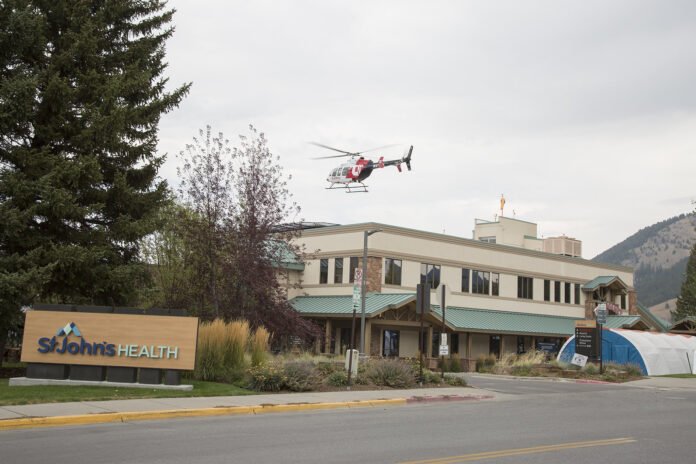JACKSON, Wyo. — With the signing of H.R.1 – One Big Beautiful Bill Act on July 4, sweeping impacts across Medicaid and the Affordable Care Act are predicted, according to St. John’s Health and Teton County.
St. John’s Health CEO Jeff Sollis and incoming Teton County Health Director Dr. Travis Riddell both spoke to Buckrail about potential changes to the community’s health care in the coming years.
Sollis said that anecdotal data has revealed that a large percentage of residents, who live and work in Teton County, are currently insured through the Health Insurance Marketplace. He said that it is too early to know exact increases to insurance premiums because private insurers will be determining future marketplace rates, but unsubsidized plans could be “out of reach” for most people. Sollis stressed that families who have been able to “make the math work with their finances” will be faced with the difficult decision of whether or not to remain on health insurance if subsidies are cut.
“I think in most cases, those folks are going to elect not to take up health insurance,” Sollis said.
According to the annual Community Health Needs Assessment, there is a sizable Medicaid population in Teton County. Riddell told Buckrail that 25 to 30% of his patients at Jackson Pediatrics were on Medicaid.
Sollis noted that in Teton County, about 50% of all pediatric inpatients and one-third of obstetric deliveries are Medicaid recipients. He said that Medicaid insures more than just those who fall below the federal poverty line, including people with a long-term disability, a chronic mental health illness, pregnant women and many children.
“We do know that roughly 73% of all Wyomingites that receive Medicaid are working,” Sollis said. “I think there are some making assumptions that many Medicaid recipients don’t work, and that is just not the case in the state of Wyoming.”
According to Sollis, the new legislation will require Medicaid carriers to verify their place of employment every six months. For those Wyomingites who work in agriculture or are self-employed, it could be difficult to keep up with all of the “red tape” to stay insured. Sollis said that individual counties will need to step up and help people navigate the Medicaid verification process. Sollis said that a large portion of Teton County’s residents could lose their Medicaid benefits.
“It’s such a convoluted piece of legislation,” Sollis said. “It’s not clear on how they are going to achieve $1 trillion in Medicaid cuts.”
Sollis emphasized that a growing number of uninsured residents could impact the quality of care provided at hospitals and at privately run health clinics. He said that clinics do not have the obligation to treat patients without health insurance, unless patients have the ability to pay with cash. He explained that a patient’s health concern could worsen over time if they delay medical care due to lack of insurance.
Unlike private medical clinics, hospitals must provide medical care to all patients, even those who are uninsured. Sollis said that “uncompensated care” could gradually cause “bad debt” for hospitals, which could then impact services or, for worst case scenarios, cause hospitals to permanently shut their doors.
Sollis said that St. John’s Hospital has already been receiving too many patients who are unable to pay for services. In many cases, Sollis said, people are underinsured with high deductible plans or “catastrophic plans,” resulting in high out-of-pocket costs. According to Sollis, uncompensated care has increased by 27% every year, resulting in a $2 million deficit over the past fiscal year at St. John’s Health.
“We’ve had to make some of those hard choices,” Sollis said. “We’ve actually had to shut down a couple of our clinics — one in Lander and one in Grand Teton National Park. We have no future planned closures. We are hopeful that we can survive this storm … but we may be forced to make some tough decisions.”
Riddell also said that people could expect to see hospitals cutting back on services — obstetric services in particular.
“Although we have some insulation … I don’t know that we are totally immune,” Riddell said. “I think St. John’s is in the position that one might describe as tenuous in the first place. This makes their finances even more difficult.”
Sollis stressed that St. John’s will remain committed to its staff and that personnel cuts would be a very last resort. Riddell also said that the recent legislation should not impact the staff at the Teton County Health Department. He noted that staffing has already been reduced due to state level budget cuts this past year.
Both Sollis and Riddell said that the upcoming changes to health care could even impact those who do not currently receive Marketplace or Medicaid coverage due to premium and deductible increases, and rising health care costs.
“When health care systems are under duress and receiving less income from federal sources like Medicaid, they will seek to make that up in other ways,” Riddell said. “Unfortunately, that means charging more to people that can pay. That’s the way markets work. This is something that is going to impact everyone across the board.”
In spite of the unknown changes ahead, Riddell praised the health care workers in Jackson for doing a “remarkable job of maintaining a high quality of care.”
“We live in a small, isolated, rural community that already has really limited access to health care,” Riddell said. “I think that St. John’s and health care in general is valued in this community. I hope that we can continue that given all of these changes.”






